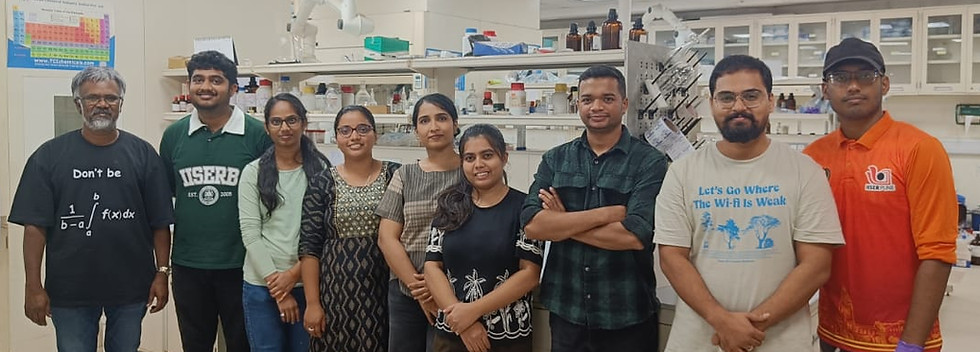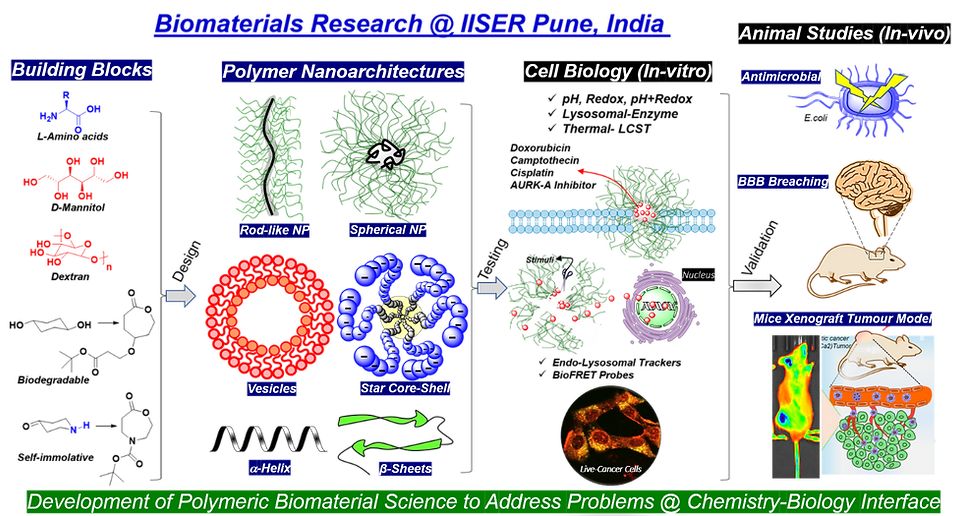
Research Overview
Our research programme is emphasized on the creation of new knowledge and therapeutic technologies at the interface of chemistry-and-biology by empowering the remarkable macromolecular science (polymers). The research programs are designed to impart training in next generation undergraduate and graduate students with equal importance to synthesis, nanoscience, in-vitro cell biology and in-vivo animal studies for biomedical application.
Research Topics
-
Structure-Engineering of Polymeric Biomaterials
-
Anticancer Drug Delivery in Cancer Research
-
Development of Fluorescent Cellular Bioprobes
-
Antimicrobial Polymers; Mechanism & Imaging
-
Synthetic Strategies to Biodegradable Polymers

Research Theme and Design Strategy: The polymeric biomaterials are build using bio-based starting materials by employing eco-friendly synthetic process, apply nanotechnology tools to study their self-assembly aspects under physiological conditions, and probe their actions under in-vitro and in-vivo to solve problems in biomedical field.
Biomaterial science is emerging as integral components in biomedical research. Our group is working in this area for past 20 years and we have explored the potential of macromolecular science at the chemistry-biology interface. New polymerization methodologies are developed to access bio-resources based biodegradable polymeric nanomaterials from L-amino acids, sugars, and polysaccharides, etc. The “macromolecular effect” is combined with emerging photophysical concepts for in-depth understanding of biodegradation aspects in living cancer cells models. p-Conjugated fluorescent chromophores are incorporated in polymer platform to build intracellular stimuli-responsive FRET probes in the entire visible region to study the real-time biodegradation and drug targeting in living cells. Single wavelength photo-excitable and dual colour emitting nano-emitter working under excited state intramolecular proton transfer (ESIPT) concept was built to lysosomal biogenesis, a primary cellular mechanism responsible for the transportation of payloads from extracellular to intracellular organelles in biology. Polymer architectures were carefully tweaked for the precise control of nano-compartmentalization in core-shell single polymer nanocarrier or unimolecular micelle nanoparticles. Tumour xenograft mice models were developed to study the efficacy of these tailor-made polymer nano-scaffolds in solid tumour suppression in ovarian and pancreatic cancers. Efforts were taken to breach of blood brain barrier to deliver payloads to brain tissues that could lead solution in the most challenging glioblastoma models (or brain tumour). Our lab students are trained in various polymerization methodologies such as melt polycondensation, ring opening polymerization and emulsion polymerization techniques. Additionally, they are also trained to handle various biochemistry tools, given hands-on training in various cancer cell lines (in vitro) and in-vivo studies in animal models (mice). This gives us ample opportunity to perform research cutting-across the disciplines in both chemistry-biology so that long-term challenges could be addresses in health care industry both in India and globally.
Recent Publications
Google Scholar
https://scholar.google.com/citations?user=DPGW82gAAAAJ&hl=en
Autodegradable Polyzwitterionic Nanoplatform to Target and Suppress Solid Tumor in Mice Xenografts
Shahidkhan Pathan, Kajal Singh, Manickam Jayakannan
Small 2025, 21, e09518
Tweaking Unimolecular Micellar Nanoarchitecture for Drug Delivery in Tumor Xenograft Mice Models
Shahidkhan Pathan, Manickam Jayakannan
Small 2025, 21, 2503155.
ESIPT Nano-emitter to Probe Lysosome Biogenesis in Live Cells
Mishika Virmani, Manickam Jayakannan
Small, 2025, 21, 2500916
Unimolecular Micelle for MLN8237 Delivery to Target AURKA-RalA Crosstalk for Ras-driven Tumor Suppression in Mice Xenografts
Kajal Singh, Shahidkhan Pathan, Mehak Malhotra, Manickam Jayakannan, Nagaraj Balasubramanian
Biomacromolecules 2025, 26, 4948-4966
Synthetic Strategy to High Molecular Weight Poly(ʟ-Tyrosine) and Their Unexplored β-Sheet Block Copolymer Nano-architectures
Parshuram Kambale, Rahul Nishal, and Manickam Jayakannan
Biomacromolecules 2025, 26, 2580-2600
Zwitterionic Strategy to Stabilize Self-immolative Polymer Nanoarchitecture Under Physiological pH for Drug Delivery In vitro and In vivo
Shahidkhan Pathan, Manickam Jayakannan
Advanced Healthcare Materials, 2024, 13, 2304599
Star-Polymer Unimolecular Micelle Nanoparticle to Deliver Payload Across the Blood-Brain Barrier
Mehak Malhotra, Meenakshi Pardasani, Shahidkhan Pathan, Priyadharshini Srikanth, Karishma Shaw, Nixon M. Abraham, Manickam Jayakannan
Nanoscale, 2024, 16, 21582-21593.
Melt Polycondensation Strategy to Access Unexplored L-Amino acid and Sugar Copolymers
Dheeraj Chandra Joshi, Utreshwar Arjun Gavhane, Manickam Jayakannan
Biomacromolecules, 2024, 25 (11), 7311-7322
Size and Shape-controlled Biodegradable Polymer Brushes Based on L-Amino acid for Intracellular Drug Delivery and Deep-Tissue Penetration
Utreshwar Arjun Gavhane, Dheeraj Chandra Joshi, and Manickam Jayakannan
Biomacromolecules, 2024, 25, 3756-3774

Contact
Professor Dr. Manickam Jayakannan, FRSC
Department of Chemistry
Indian Institute of Science Education and Research (IISER Pune)
Dr. Homi Bhabha Road, Pune 411008, Maharashtra, India
Phone: +91-20-2590 8087
E-mail: jayakannan@iiserpune.ac.in (or) jayakannan18@gmail.com

